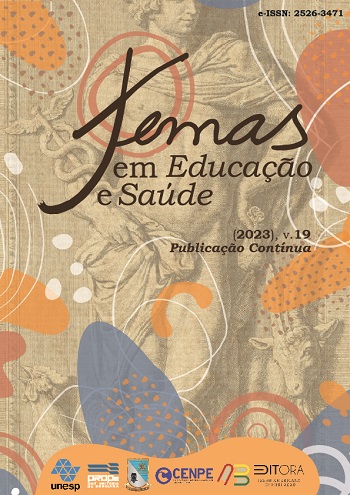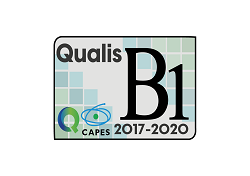The ChatGPT in the health education of people with intestinal ostomies
Potentialities and controversies
DOI:
https://doi.org/10.26673/tes.v19i00.18435Keywords:
Machine learning, Teaching, Enterostomal therapy, Artificial intelligence, TechnologyAbstract
The objective was to explore a sequential way of using ChatGPT in health education for people with an intestinal stoma, using a fictitious case based on Marjory Gordon. This is an experience report in 6 stages, the clinical case (ETRB user) was prepared by the group of authors. Artificial Intelligence (AI), after being trained, was notably able to define affected Gordon patterns, and health education needs, classify products to be used and ways of re-approaching even patterns judged as more subjective, and finally, recommend goals. Even considering bioethical dilemmas, it is problematized that ChatGPT is useful, imitating human reasoning, however, through a “dead direct language”, thus, professional experience is the key to using ChatGPT. Living Work in action cannot be captured by AI, and, if there is no professional reflexivity, there is no way for dialogization and implementation of practice/education as “living perceptions”.
Downloads
References
ACTIS, A. M. Consideraciones bioéticas en relación con el uso de la inteligencia artificial en mastología. Revista Médica del Uruguay, [S. l.], v. 37, n. 4, 2021. DOI: 10.29193/rmu.37.4.12. Disponível em: http://www.scielo.edu.uy/scielo.php?pid=S1688-03902021000401502&script=sci_abstract. Acesso em: 15 jul. 2023.
ALVERO, R. ChatGPT: rumors of human providers’ demise have been greatly exaggerated. Fertility and Sterility, [S. l.], v. 119, n. 6, p. 930-931, 2023. DOI: 10.1016/j.fertnstert.2023.03.010. DOI: 10.1016/j.fertnstert.2023.03.010. Disponível em: https://www.fertstert.org/article/S0015-0282(23)00217-0/fulltext. Acesso em: 12 set. 2023.
BAUMAN, Z. Da oclusão mental à revolução permanente. In: BAUMAN, Z. Sobre educação e juventude: conversas com Ricardo Mazzeo. Rio de Janeiro: Zahar, 2013. p. 18-25.
BRASIL. Ministério da Saúde. Secretaria de Atenção Especializada em Saúde. Departamento de Atenção Especializada e Temática. Guia de atenção à saúde da pessoa com estomia. Brasília, DF: Ministério da Saúde, 2021.
CHOI, E. P. H. et al. Chatting or cheating? The impacts of ChatGPT and other artificial intelligence language models on nurse education. Nurse Education Today, [S. l.], v. 125, p. 105796-105796, 2023. DOI: 10.1016/j.nedt.2023.105796. Disponível em: https://pubmed.ncbi.nlm.nih.gov/36934624/. Acesso em: 12 set. 2023.
FIJAČKO, N. et al. Can ChatGPT pass the life support exams without entering the American heart association course? Resuscitation, [S. l.], v. 185, 2023. DOI: 10.1016/j.resuscitation.2023.109732. Disponível em: https://pubmed.ncbi.nlm.nih.gov/36775020/. Acesso em: 12 set. 2023.
FONTENOT, J. Artificial intelligence in nursing education: Embrace, ignore, or proceed with caution. Teaching and Learning in Nursing, [S. l.], v. 18, n. 3, 2023. DOI: 10.1016/j.teln.2023.03.018. Disponível em: https://www.sciencedirect.com/science/article/abs/pii/S1557308723000653?via%3Dihub. Acesso em: 12 set. 2023.
GORDON, M.; SWEENEY, M. A.; MCKEEHAN, K. Nursing diagnosis: looking at its use in the clinical area. The American Journal of Nursing, [S. l.], v. 80, n. 4, p. 672-674, 1980. DOI: 10.2307/3470095. Disponível em: https://www.jstor.org/stable/3470095?origin=crossref. Acesso em: 12 set. 2023.
GORDON, Marjory. Practice-based data set for a nursing information system. Journal of Medical Systems, [S. l.], v. 9, p. 43-55, 1985. DOI: 10.1007/BF00992521. Disponível em: https://doi.org/10.1007/BF00992521. Acesso em: 12 set. 2023.
GORDON, M. Pasado, presente y futuro de los diagnósticos de enfermería. Cultura de los Cuidados, [S. l.], v. 19, n. 42, p. 172-178, 2015. DOI: 10.14198/cuid.2015.42.16. Disponível em: http://rua.ua.es/dspace/handle/10045/49340. Acesso em: 12 set. 2023.
GUNAWAN, J. Exploring the future of nursing: Insights from the ChatGPT model. Belitung Nursing Journal, [S. l.], v. 9, n. 1, p. 1-5, 2023. DOI: 10.33546/bnj.2551. DOI: 10.33546/bnj.2551 . Disponível em: https://www.belitungraya.org/BRP/index.php/bnj/article/view/2551. Acesso em: 12 set. 2023.
HAN, B. C. Pedagogia do ver. In: HAN, B. C. (org.). Sociedade do cansaço. 2. ed. Petrópolis: Vozes, 2017a. p. 51-58.
HAN, B. C. Sociedade positiva. In: HAN, B. C. (org.). Sociedade da Transparência. 2. ed. Petrópolis: Vozes, 2017b. p. 09-25.
HARDER, N. Using ChatGPT in Simulation Design: What Can (or Should) It Do for You? Clinical Simulation in Nursing, [S. l.], v. 78, p. A1-A2, 2023. DOI: 10.1016/j.ecns.2023.02.011. DOI: 10.1016/j.ecns.2023.02.011. Disponível em: https://www.nursingsimulation.org/article/S1876-1399(23)00018-X/fulltext. Acesso em: 12 set. 2023.
ISMAIL, A.; GHORASHI, N. S.; JAVAN, R. New horizons: the potential role of OpenAI’s ChatGPT in clinical radiology. Journal of the American College of Radiology, [S. l.], v. 20, n. 7, p. 696 – 698, 2023. DOI: 10.1016/j.jacr.2023.02.025. DOI: 10.1016/j.jacr.2023.02.025. Disponível em: https://www.jacr.org/article/S1546-1440(23)00259-4/fulltext. Acesso em: 12 set. 2023.
JARA, O. A educação na América Latina: o desafio de teorizar a prática para transformar. In: CARDENAL, E. et al. (org.). Lições da Nicarágua: a experiência da esperança. 3. ed. Campinas: Papirus, 1987. p. 84-103.
JOHNSON, S. B. et al. Using ChatGPT to evaluate cancer myths and misconceptions: artificial intelligence and cancer information. JNCI cancer spectrum, [S. l.], v. 7, n. 2, p. pkad015, 2023. DOI: 10.1093/jncics/pkad015. Disponível em: https://academic.oup.com/jncics/article/7/2/pkad015/7078555. Acesso em: 12 set. 2023.
KOO, M. Harnessing the potential of chatbots in education: The need for guidelines to their ethical use. Nurse education in practice, [S. l.], v. 68, p. 103590, 2023. DOI: 10.1016/j.nepr.2023.103590. Disponível em: https://www.sciencedirect.com/science/article/abs/pii/S1471595323000525?via%3Dihub.
Acesso em: 12 set. 2023.
LANÇA, E. 7 pilares para criar um prompt de sucesso no chatGPT. Instituto Eliel Lança: 2023. Disponível em: https://www.eliellanca.com.br/inteligencia-artificial/os-7-pilares-para-criar-um-prompt-de-sucesso-no-chatgpt/. Acesso em: 02 set. 2023.
MACLEOD, L. Making SMART goals smarter. Physician executive, [S. l.], v. 38, n. 2, p. 68, 2012. Disponível em: https://www.researchgate.net/publication/256098067_Making_SMART_goals_smarter. Acesso em: 15 jul. 2023.
MENESES, A. S. Inteligência artificial na enfermagem: potenciais aplicações e implicações éticas do "ChatGPT". Zenodo [Preprint], [S. l.], v. 1, 2023. DOI: 10.5281/zenodo.7627068. Disponivel em: https://zenodo.org/records/7627068. Acesso em: 02 set. 2023.
MERHY, E. E. Em busca do tempo perdido: a micropolítica do trabalho vivo em saúde. In: MERHY, E. E; ONOCKO, R. Agir em Saúde: um desafio para o público. São Paulo: Hucitec, 1997. p. 71-112.
NATURE. Tools such as ChatGPT threaten transparent science; here are our ground rules for their use. Nature, [S. l.], v. 613, n. 612, p. 10.1038, 2023. DOI: 10.1038/d41586-023-00191-1. Disponivel em: https://www.nature.com/articles/d41586-023-00191-1. Acesso em: 12 set. 2023.
O'CONNOR, S. Open artificial intelligence platforms in nursing education: Tools for academic progress or abuse? Nurse Education in Practice, [S. l.], v. 66, p. 103537-103537, 2023. DOI: 10.1016/j.nepr.2022.103537. Disponível em: https://www.sciencedirect.com/science/article/abs/pii/S1471595322002517?via%3Dihub. Acesso em: 12 set. 2023.
ODOM-FORREN, J. The role of ChatGPT in perianesthesia nursing. Journal of PeriAnesthesia Nursing, [S. l.], v. 38, n. 2, p. 176-177, 2023. DOI: 10.1016/j.jopan.2023.02.006. Disponível em: https://www.jopan.org/article/S1089-9472(23)00066-7/fulltext. Acesso em: 07 nov. 2023.
PEREIRA, A. S.; SILVA, T. R. Um furo em mim: considerações sobre a escuta clínica de pacientes estomizados. Analytica: Revista de Psicanálise, [S. l.], v. 11, n. 21, p. 1-18, 2022. Disponível em: http://seer.ufsj.edu.br/analytica/article/view/4005. Acesso em: 12 set. 2023.
RODRIGUES, F. L. L. O uso da Inteligência Artificial no âmbito da saúde: os limites de sua utilização frente às questões da privacidade e a busca pela ampla garantia da inclusão dos benefícios. In: LOPES, A. M. D. et al. (org). Neurodireito, neurotecnologia e direitos humanos. Porto Alegre: Livraria do Advogado, 2022. p. 131-142.
SCERRI, A.; MORIN, K. H. Using chatbots like ChatGPT to support nursing practice. Journal of Clinical Nursing, [S. l.], v. 32, n. 15-16, p, 4211-4213, 2023. DOI: 10.1111/jocn.16677. Disponível em: https://onlinelibrary.wiley.com/doi/full/10.1111/jocn.16677. Acesso em: 15 jul. 2023.
SOBEST. Consenso Brasileiro de Cuidado às Pessoas Adultas com Estomias de Eliminação 2020. 1. ed. São Paulo: Segmento Farma Editores, 2021. 52 p.
SONOBE, H. M. et al. O método do arco no ensino pré-operatório de pacientes laringectomizados. Revista Brasileira de Cancerologia, [S. l.], v. 47, n. 4, p. 425-433, 2001. DOI: 10.32635/2176-9745.RBC.2001v47n4.2291. Disponível em: https://rbc.inca.gov.br/index.php/revista/article/view/2291. Acesso em: 12 set. 2023.
SONOBE, H. M.; BARICHELLO, E.; ZAGO, M. M. F. A visão do colostomizado sobre o uso da bolsa de colostomia. Revista Brasileira de Cancerologia, [S. l.], v. 48, n. 3, p. 341-348, 2002. DOI: 10.32635/2176-9745.RBC.2002v48n3.2180. Disponível em: https://rbc.inca.gov.br/index.php/revista/article/view/2180. Acesso em: 12 set. 2023.
SOUZA, M. F. et al. Bases teórico-metodológicas para a coleta de dados de enfermagem. In: BARROS, A. L. B. L. (org.). Anamnese e exame físico: avaliação diagnóstica de enfermagem do adulto. 3. Ed. Porto Alegre: Artmed, 2016. p. 17-47.
SWEDBERG, R. Exploratory research. In: ELMAN, C.; GERRING, J.; MAHONEY, J. The production of knowledge: Enhancing progress in social Science. Cambridge, 2020. p. 17-41. DOI: 10.1017/9781108762519. Disponível em: https://www.cambridge.org/core/books/production-of-knowledge/4554525E4C33B4809AE5F77BA5B9C2AE. Acesso em: 12 set. 2023.
WHO. WORLD HEALTH ORGANIZATION (WHO). Ethics and governance of artificial intelligence for health: WHO guidance. 2021. Disponível em: https://www.who.int/publications/i/item/9789240029200. Acesso em: 01 set. 2023.
Published
How to Cite
Issue
Section
License
Os manuscritos aceitos e publicados são de propriedade da Temas em Educação e Saúde. Os artigos publicados e as referências citadas na Temas em Educação e Saúde são de inteira responsabilidade de seus autores. É vedada a tradução para outro idioma sem a autorização escrita do Editor ouvida a Comissão Editorial.







